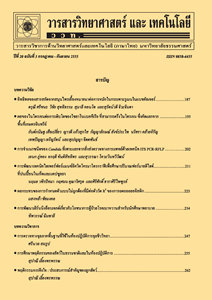Potential of Using Smart Grid Technology for the Electrical Energy Management in the Building Air-conditioning Systems During the Summer, Case Study: Building in the Area of Phayao University
Main Article Content
Abstract
This research has been studied for the context of the area in order to create the database and assess the trend pattern of electric energy consumption of the air conditioning system in the building of the education area during summer. The research focuses on the use of renewable energy from the smart grid UP, Phayao University. The results of this study can be used to design and create alternative energy management based on smart grid technologies for reducing the demand charge of Thailand. The results from data collection and analysis of the potential of the renewable energy system in the prototype area show that the smart grid UP can generate the average electricity at 0.80 kWh-day/(PV area)m2 with an average efficiency of electricity production from solar energy of 17.68 %. In addition, the testing in the prototype area also shows that the demand charge and the average electric energy consumption of the air conditioning system are 77.898 W/(air-condition area)m2 and 0.297 kWh-day/(air condition area)m2, respectively. Evaluating from electricity generating system installed at the building at 60 kWp, the system can reduce the demand charge by about 24.05 % at the level of 26.61 kW from the maximum demand charge 110.42 kW. However, the electrical energy can be used for the air conditioning system for only 68.06 %. From the data collected in the period between 9.00 and 13.00, the electricity can be used for the air conditioning system only 47.90 % of the electricity production. According to the study, it was found that the utilization of electricity is limited by the outdoor environment and the building use. Therefore, the approach that can use to increase the efficiency of electricity generation and the efficiency of electrical energy utilization in the building air-conditioning system is the building energy management system (BEMS) and the control of electrical energy usage according to smart grid technologies, which can change the demand for electricity (Demand Response, DR). This technology leads to a stable and efficient connection between the main grid and the renewable energy system, which require further study.
Article Details
References
Information from the Electricity Generating Authority of Thailand, Power Demand of the System, Available Source: https://www.egat.co.th/index.php?option=com_content&view=article&id=348&Itemid=116, February 9, 2018. (in Thai)
Development and Investment Guide to Solar Power Production, 2011, Solar Power Potential of Thailand, Department of Alternative Energy Development and Efficiency, Ministry of Energy, Bangkok. (in Thai)
Bayindir, R., Colak, I., Fulli, G. and Demirtas, K., 2016, Smart grid technologies and applications, Renew. Sustain. Energy Rev. 66: 499-516.
Murayama, D., Mitsumoto, K., Takagi, Y., Iino, Y. and Yamamori, S., 2012, Smart grid ready BEMS adopting model-based HVAC control for energy saving, Proceedings IEEE PES Transmission and Distribution Conference and Exposition (T&D), Orlando, FL.
Park, K., Kim, Y., Kim, S., Kim, K., Lee, W. and Park, H., 2011, Building energy management system based on smart grid, Proceedings IEEE 33rd International Telecommunications Energy Conference (INTELEC), Amsterdam.
Mocanu, E., 2014, Optimizing the Energy Exchange between the Smart Grid and Building Systems, Proceedings 49th International Universities Power Engineering Conference (UPEC), Cluj-Napoca.
ASHRAE Handbook – Fundamentals, SI Ed., 2017, Chapter 17: Residential Cooling and Heating Load Calculations, Peachtree Corners, GA.
Sakulchangsatjatai, P. and Kespradit, P., 2012, Study of Solar Cell Effciency with Heat Pipe for Development of Sustainable Energy, Faculty of Engineering, Chiang Mai University, Chiang Mai. (in Thai)
Energy Efficiency Plan (EEP), 2015, Energy Baseline and Building Energy Code (BEC), Ministry of Energy, Bangkok. (in Thai)
Tantiwanit, K., 2010, Benchmarking energy use towards systematic energy management in commercial bank branch, J. Architect. Plan. Res. Stud. 7(2): 189-203. (in Thai)


